HRM Report: Developing Individuals, Teams, and Organizations
VerifiedAdded on 2021/02/19
|17
|4958
|25
Report
AI Summary
This report delves into the crucial aspects of developing individuals, teams, and organizations within the framework of Human Resource Management (HRM). It begins by analyzing the employee knowledge, skills, and behaviors required by HR professionals, emphasizing the importance of Continuing Professional Development (CPD). The report then explores personal skill audits and the creation of Personal Development Plans (PDPs), illustrating how these tools can identify skill gaps and facilitate professional growth. Furthermore, it differentiates between organizational and individual learning, examining continuous learning and professional development within an organizational context. The report also addresses collaborative working and performance management, providing critical analyses of different approaches to enhance employee engagement and organizational effectiveness. The report is based on a case study of Alexandra-Reisse, a consulting firm specializing in financial management.
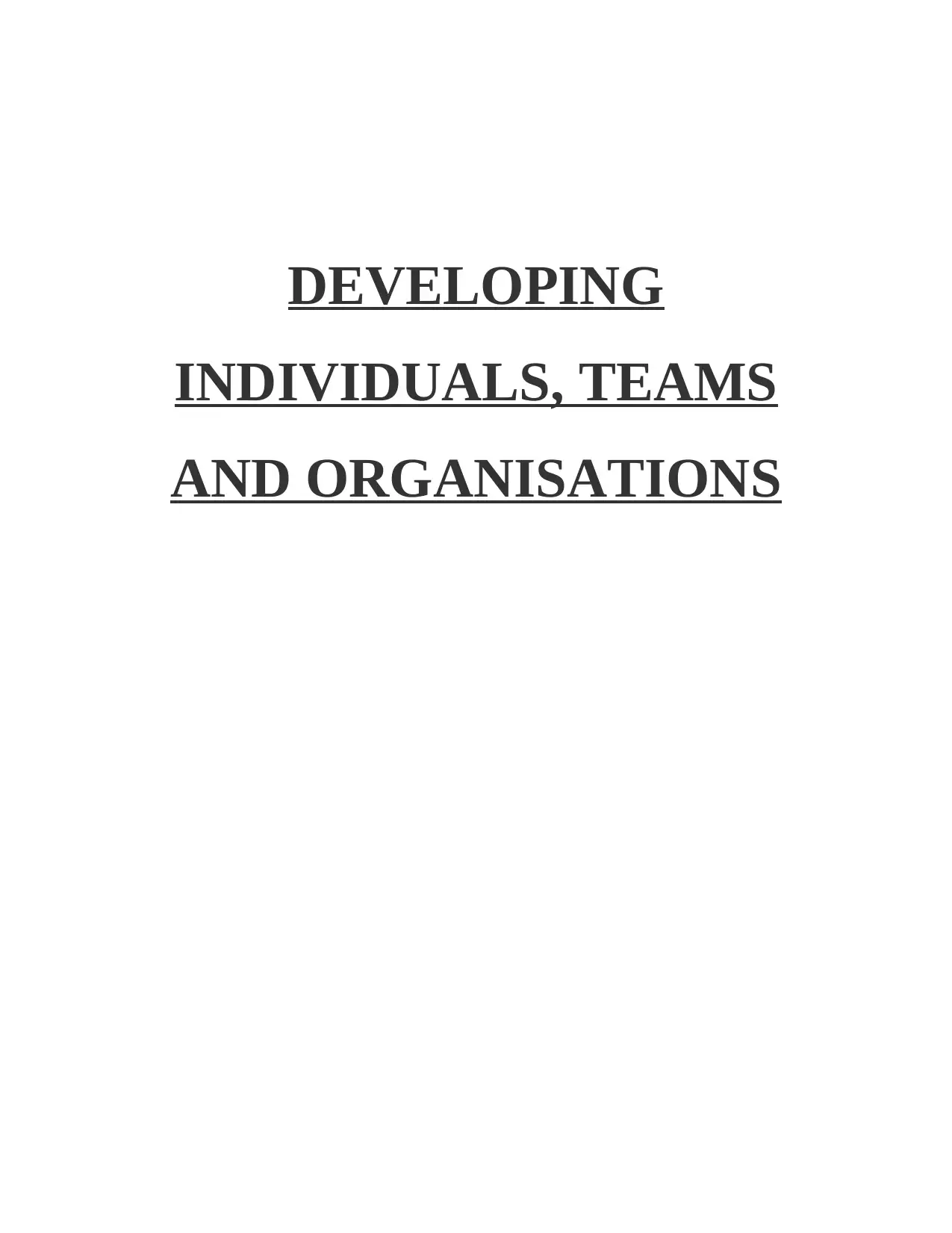
DEVELOPING
INDIVIDUALS, TEAMS
AND ORGANISATIONS
INDIVIDUALS, TEAMS
AND ORGANISATIONS
Paraphrase This Document
Need a fresh take? Get an instant paraphrase of this document with our AI Paraphraser
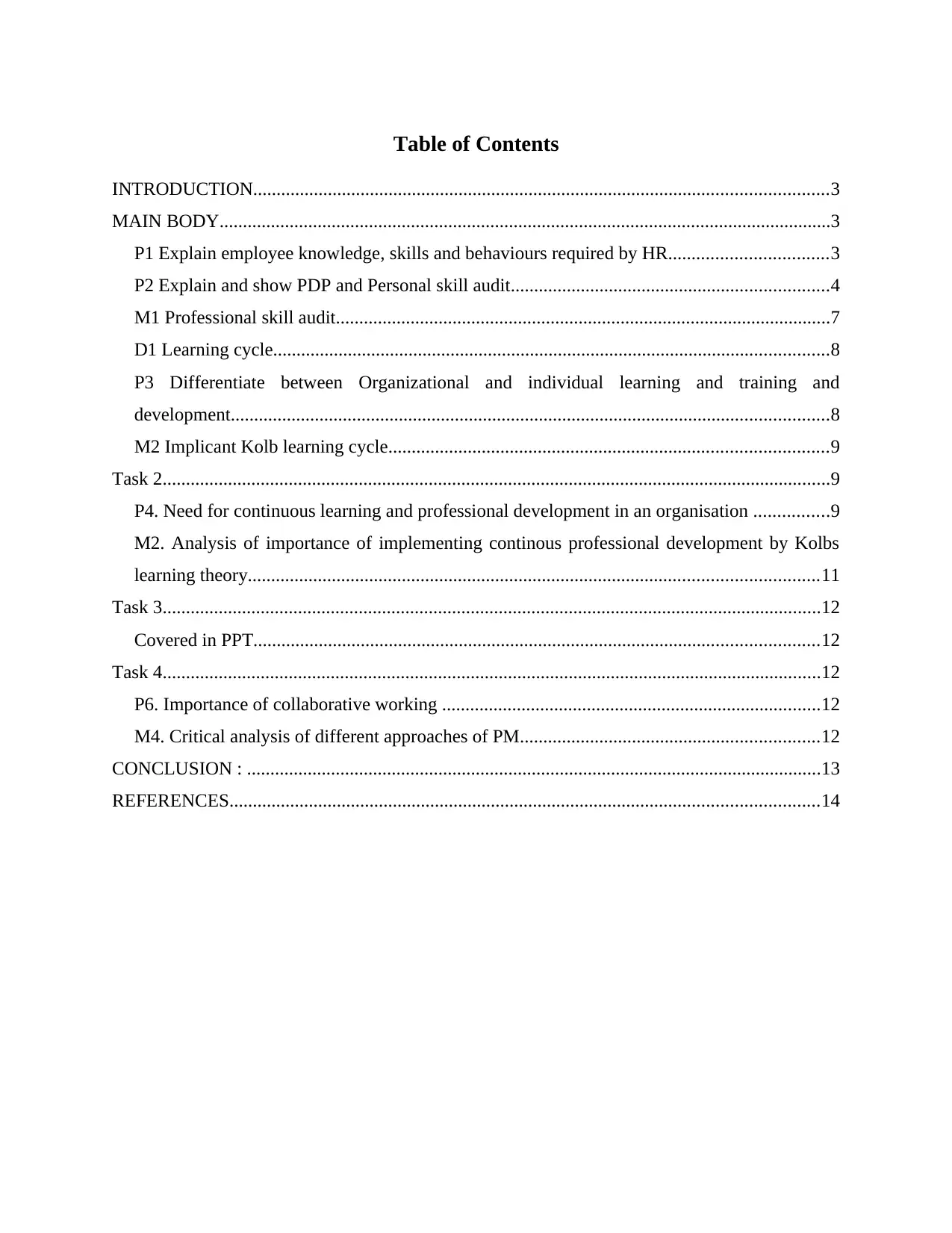
Table of Contents
INTRODUCTION...........................................................................................................................3
MAIN BODY...................................................................................................................................3
P1 Explain employee knowledge, skills and behaviours required by HR..................................3
P2 Explain and show PDP and Personal skill audit....................................................................4
M1 Professional skill audit..........................................................................................................7
D1 Learning cycle.......................................................................................................................8
P3 Differentiate between Organizational and individual learning and training and
development................................................................................................................................8
M2 Implicant Kolb learning cycle..............................................................................................9
Task 2...............................................................................................................................................9
P4. Need for continuous learning and professional development in an organisation ................9
M2. Analysis of importance of implementing continous professional development by Kolbs
learning theory..........................................................................................................................11
Task 3.............................................................................................................................................12
Covered in PPT.........................................................................................................................12
Task 4.............................................................................................................................................12
P6. Importance of collaborative working .................................................................................12
M4. Critical analysis of different approaches of PM................................................................12
CONCLUSION : ...........................................................................................................................13
REFERENCES..............................................................................................................................14
INTRODUCTION...........................................................................................................................3
MAIN BODY...................................................................................................................................3
P1 Explain employee knowledge, skills and behaviours required by HR..................................3
P2 Explain and show PDP and Personal skill audit....................................................................4
M1 Professional skill audit..........................................................................................................7
D1 Learning cycle.......................................................................................................................8
P3 Differentiate between Organizational and individual learning and training and
development................................................................................................................................8
M2 Implicant Kolb learning cycle..............................................................................................9
Task 2...............................................................................................................................................9
P4. Need for continuous learning and professional development in an organisation ................9
M2. Analysis of importance of implementing continous professional development by Kolbs
learning theory..........................................................................................................................11
Task 3.............................................................................................................................................12
Covered in PPT.........................................................................................................................12
Task 4.............................................................................................................................................12
P6. Importance of collaborative working .................................................................................12
M4. Critical analysis of different approaches of PM................................................................12
CONCLUSION : ...........................................................................................................................13
REFERENCES..............................................................................................................................14
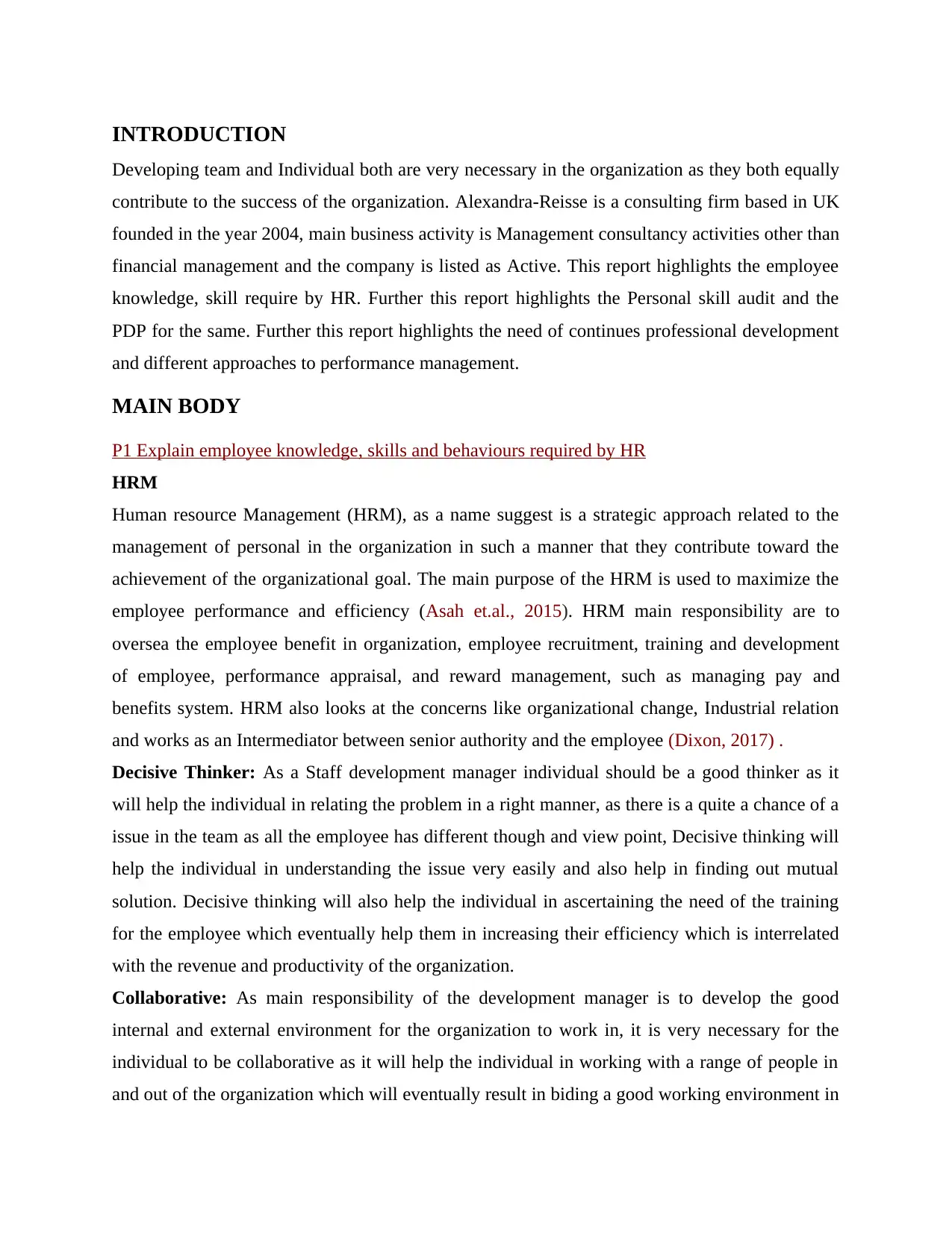
INTRODUCTION
Developing team and Individual both are very necessary in the organization as they both equally
contribute to the success of the organization. Alexandra-Reisse is a consulting firm based in UK
founded in the year 2004, main business activity is Management consultancy activities other than
financial management and the company is listed as Active. This report highlights the employee
knowledge, skill require by HR. Further this report highlights the Personal skill audit and the
PDP for the same. Further this report highlights the need of continues professional development
and different approaches to performance management.
MAIN BODY
P1 Explain employee knowledge, skills and behaviours required by HR
HRM
Human resource Management (HRM), as a name suggest is a strategic approach related to the
management of personal in the organization in such a manner that they contribute toward the
achievement of the organizational goal. The main purpose of the HRM is used to maximize the
employee performance and efficiency (Asah et.al., 2015). HRM main responsibility are to
oversea the employee benefit in organization, employee recruitment, training and development
of employee, performance appraisal, and reward management, such as managing pay and
benefits system. HRM also looks at the concerns like organizational change, Industrial relation
and works as an Intermediator between senior authority and the employee (Dixon, 2017) .
Decisive Thinker: As a Staff development manager individual should be a good thinker as it
will help the individual in relating the problem in a right manner, as there is a quite a chance of a
issue in the team as all the employee has different though and view point, Decisive thinking will
help the individual in understanding the issue very easily and also help in finding out mutual
solution. Decisive thinking will also help the individual in ascertaining the need of the training
for the employee which eventually help them in increasing their efficiency which is interrelated
with the revenue and productivity of the organization.
Collaborative: As main responsibility of the development manager is to develop the good
internal and external environment for the organization to work in, it is very necessary for the
individual to be collaborative as it will help the individual in working with a range of people in
and out of the organization which will eventually result in biding a good working environment in
Developing team and Individual both are very necessary in the organization as they both equally
contribute to the success of the organization. Alexandra-Reisse is a consulting firm based in UK
founded in the year 2004, main business activity is Management consultancy activities other than
financial management and the company is listed as Active. This report highlights the employee
knowledge, skill require by HR. Further this report highlights the Personal skill audit and the
PDP for the same. Further this report highlights the need of continues professional development
and different approaches to performance management.
MAIN BODY
P1 Explain employee knowledge, skills and behaviours required by HR
HRM
Human resource Management (HRM), as a name suggest is a strategic approach related to the
management of personal in the organization in such a manner that they contribute toward the
achievement of the organizational goal. The main purpose of the HRM is used to maximize the
employee performance and efficiency (Asah et.al., 2015). HRM main responsibility are to
oversea the employee benefit in organization, employee recruitment, training and development
of employee, performance appraisal, and reward management, such as managing pay and
benefits system. HRM also looks at the concerns like organizational change, Industrial relation
and works as an Intermediator between senior authority and the employee (Dixon, 2017) .
Decisive Thinker: As a Staff development manager individual should be a good thinker as it
will help the individual in relating the problem in a right manner, as there is a quite a chance of a
issue in the team as all the employee has different though and view point, Decisive thinking will
help the individual in understanding the issue very easily and also help in finding out mutual
solution. Decisive thinking will also help the individual in ascertaining the need of the training
for the employee which eventually help them in increasing their efficiency which is interrelated
with the revenue and productivity of the organization.
Collaborative: As main responsibility of the development manager is to develop the good
internal and external environment for the organization to work in, it is very necessary for the
individual to be collaborative as it will help the individual in working with a range of people in
and out of the organization which will eventually result in biding a good working environment in
⊘ This is a preview!⊘
Do you want full access?
Subscribe today to unlock all pages.

Trusted by 1+ million students worldwide
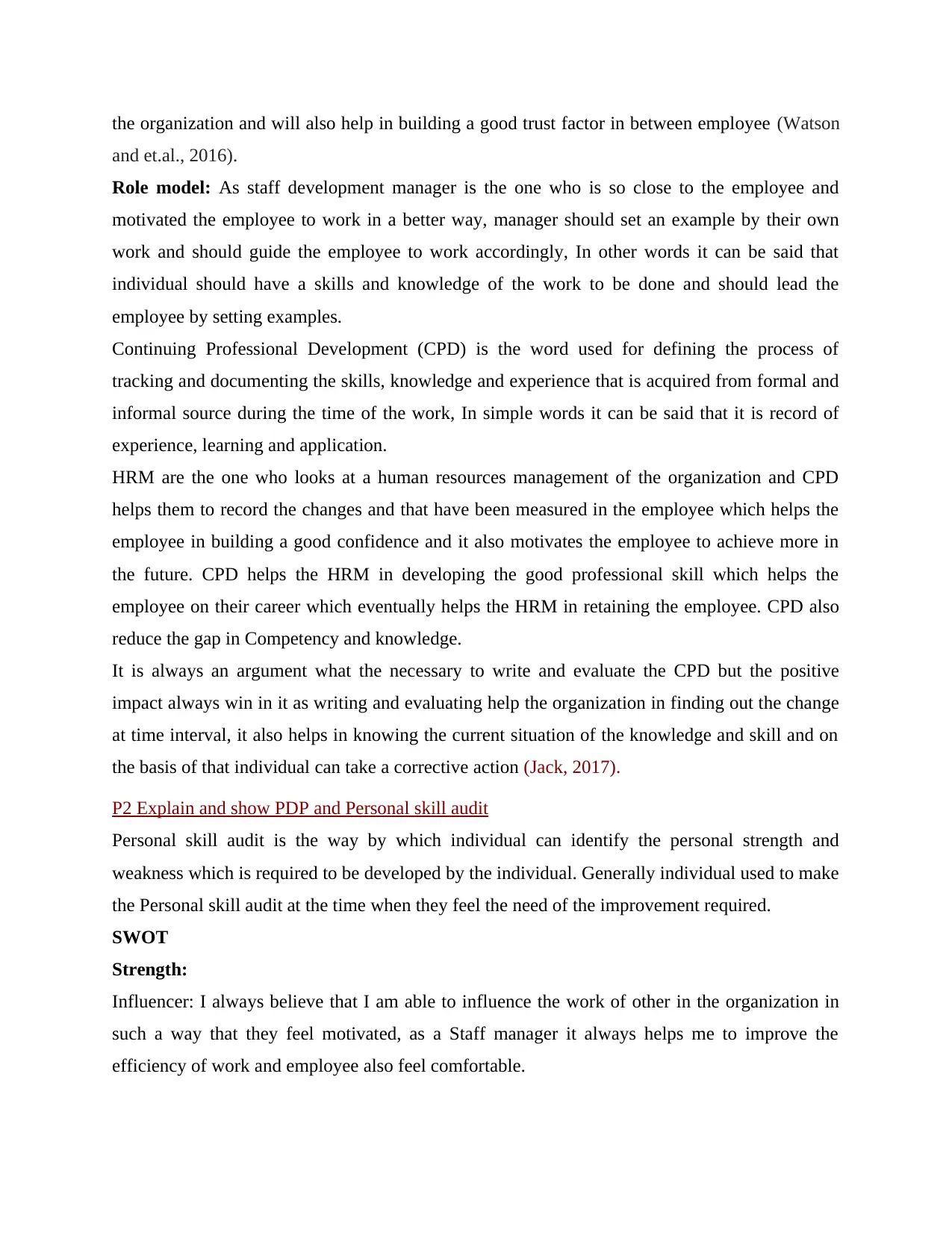
the organization and will also help in building a good trust factor in between employee (Watson
and et.al., 2016).
Role model: As staff development manager is the one who is so close to the employee and
motivated the employee to work in a better way, manager should set an example by their own
work and should guide the employee to work accordingly, In other words it can be said that
individual should have a skills and knowledge of the work to be done and should lead the
employee by setting examples.
Continuing Professional Development (CPD) is the word used for defining the process of
tracking and documenting the skills, knowledge and experience that is acquired from formal and
informal source during the time of the work, In simple words it can be said that it is record of
experience, learning and application.
HRM are the one who looks at a human resources management of the organization and CPD
helps them to record the changes and that have been measured in the employee which helps the
employee in building a good confidence and it also motivates the employee to achieve more in
the future. CPD helps the HRM in developing the good professional skill which helps the
employee on their career which eventually helps the HRM in retaining the employee. CPD also
reduce the gap in Competency and knowledge.
It is always an argument what the necessary to write and evaluate the CPD but the positive
impact always win in it as writing and evaluating help the organization in finding out the change
at time interval, it also helps in knowing the current situation of the knowledge and skill and on
the basis of that individual can take a corrective action (Jack, 2017).
P2 Explain and show PDP and Personal skill audit
Personal skill audit is the way by which individual can identify the personal strength and
weakness which is required to be developed by the individual. Generally individual used to make
the Personal skill audit at the time when they feel the need of the improvement required.
SWOT
Strength:
Influencer: I always believe that I am able to influence the work of other in the organization in
such a way that they feel motivated, as a Staff manager it always helps me to improve the
efficiency of work and employee also feel comfortable.
and et.al., 2016).
Role model: As staff development manager is the one who is so close to the employee and
motivated the employee to work in a better way, manager should set an example by their own
work and should guide the employee to work accordingly, In other words it can be said that
individual should have a skills and knowledge of the work to be done and should lead the
employee by setting examples.
Continuing Professional Development (CPD) is the word used for defining the process of
tracking and documenting the skills, knowledge and experience that is acquired from formal and
informal source during the time of the work, In simple words it can be said that it is record of
experience, learning and application.
HRM are the one who looks at a human resources management of the organization and CPD
helps them to record the changes and that have been measured in the employee which helps the
employee in building a good confidence and it also motivates the employee to achieve more in
the future. CPD helps the HRM in developing the good professional skill which helps the
employee on their career which eventually helps the HRM in retaining the employee. CPD also
reduce the gap in Competency and knowledge.
It is always an argument what the necessary to write and evaluate the CPD but the positive
impact always win in it as writing and evaluating help the organization in finding out the change
at time interval, it also helps in knowing the current situation of the knowledge and skill and on
the basis of that individual can take a corrective action (Jack, 2017).
P2 Explain and show PDP and Personal skill audit
Personal skill audit is the way by which individual can identify the personal strength and
weakness which is required to be developed by the individual. Generally individual used to make
the Personal skill audit at the time when they feel the need of the improvement required.
SWOT
Strength:
Influencer: I always believe that I am able to influence the work of other in the organization in
such a way that they feel motivated, as a Staff manager it always helps me to improve the
efficiency of work and employee also feel comfortable.
Paraphrase This Document
Need a fresh take? Get an instant paraphrase of this document with our AI Paraphraser
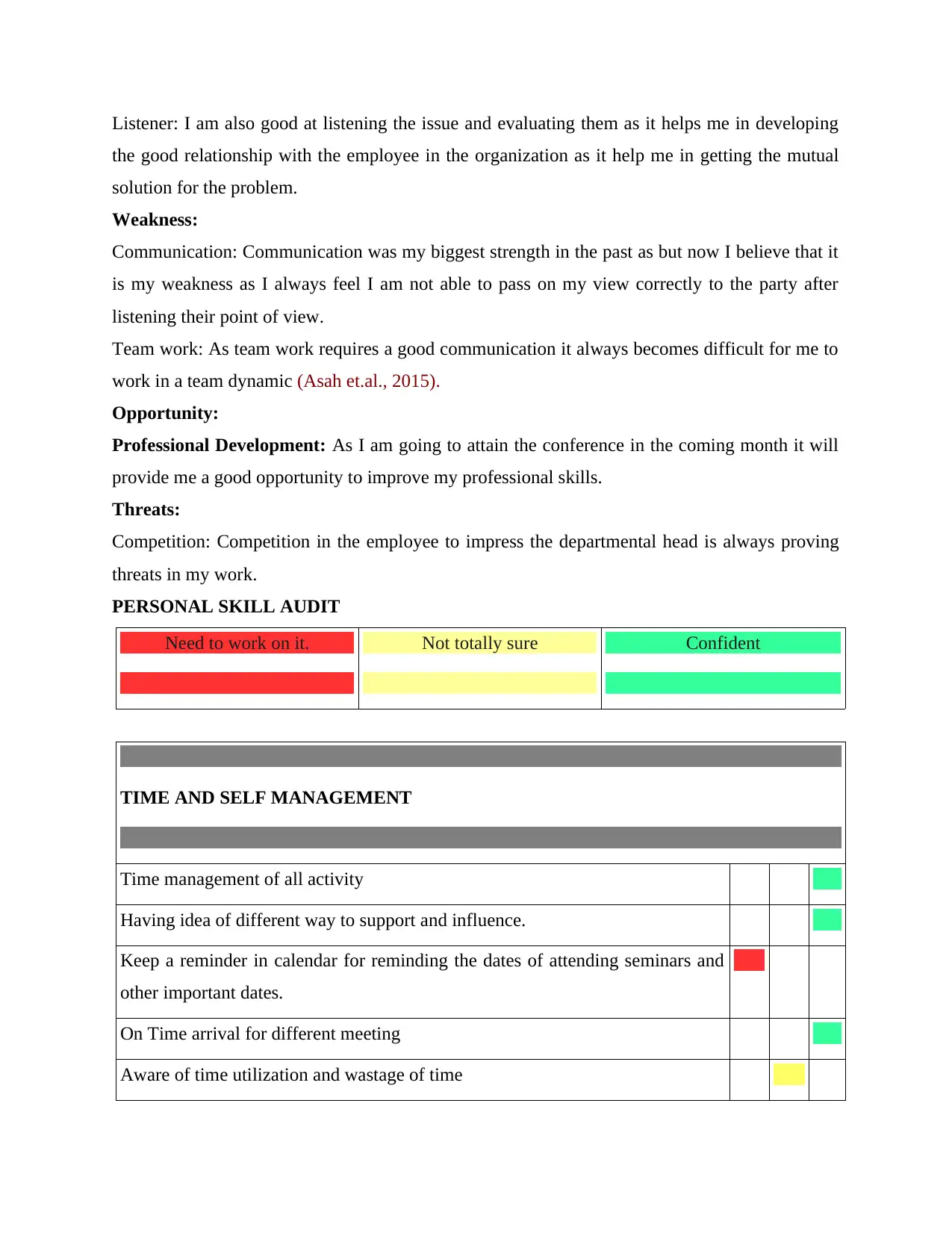
Listener: I am also good at listening the issue and evaluating them as it helps me in developing
the good relationship with the employee in the organization as it help me in getting the mutual
solution for the problem.
Weakness:
Communication: Communication was my biggest strength in the past as but now I believe that it
is my weakness as I always feel I am not able to pass on my view correctly to the party after
listening their point of view.
Team work: As team work requires a good communication it always becomes difficult for me to
work in a team dynamic (Asah et.al., 2015).
Opportunity:
Professional Development: As I am going to attain the conference in the coming month it will
provide me a good opportunity to improve my professional skills.
Threats:
Competition: Competition in the employee to impress the departmental head is always proving
threats in my work.
PERSONAL SKILL AUDIT
Need to work on it. Not totally sure Confident
TIME AND SELF MANAGEMENT
Time management of all activity
Having idea of different way to support and influence.
Keep a reminder in calendar for reminding the dates of attending seminars and
other important dates.
On Time arrival for different meeting
Aware of time utilization and wastage of time
the good relationship with the employee in the organization as it help me in getting the mutual
solution for the problem.
Weakness:
Communication: Communication was my biggest strength in the past as but now I believe that it
is my weakness as I always feel I am not able to pass on my view correctly to the party after
listening their point of view.
Team work: As team work requires a good communication it always becomes difficult for me to
work in a team dynamic (Asah et.al., 2015).
Opportunity:
Professional Development: As I am going to attain the conference in the coming month it will
provide me a good opportunity to improve my professional skills.
Threats:
Competition: Competition in the employee to impress the departmental head is always proving
threats in my work.
PERSONAL SKILL AUDIT
Need to work on it. Not totally sure Confident
TIME AND SELF MANAGEMENT
Time management of all activity
Having idea of different way to support and influence.
Keep a reminder in calendar for reminding the dates of attending seminars and
other important dates.
On Time arrival for different meeting
Aware of time utilization and wastage of time
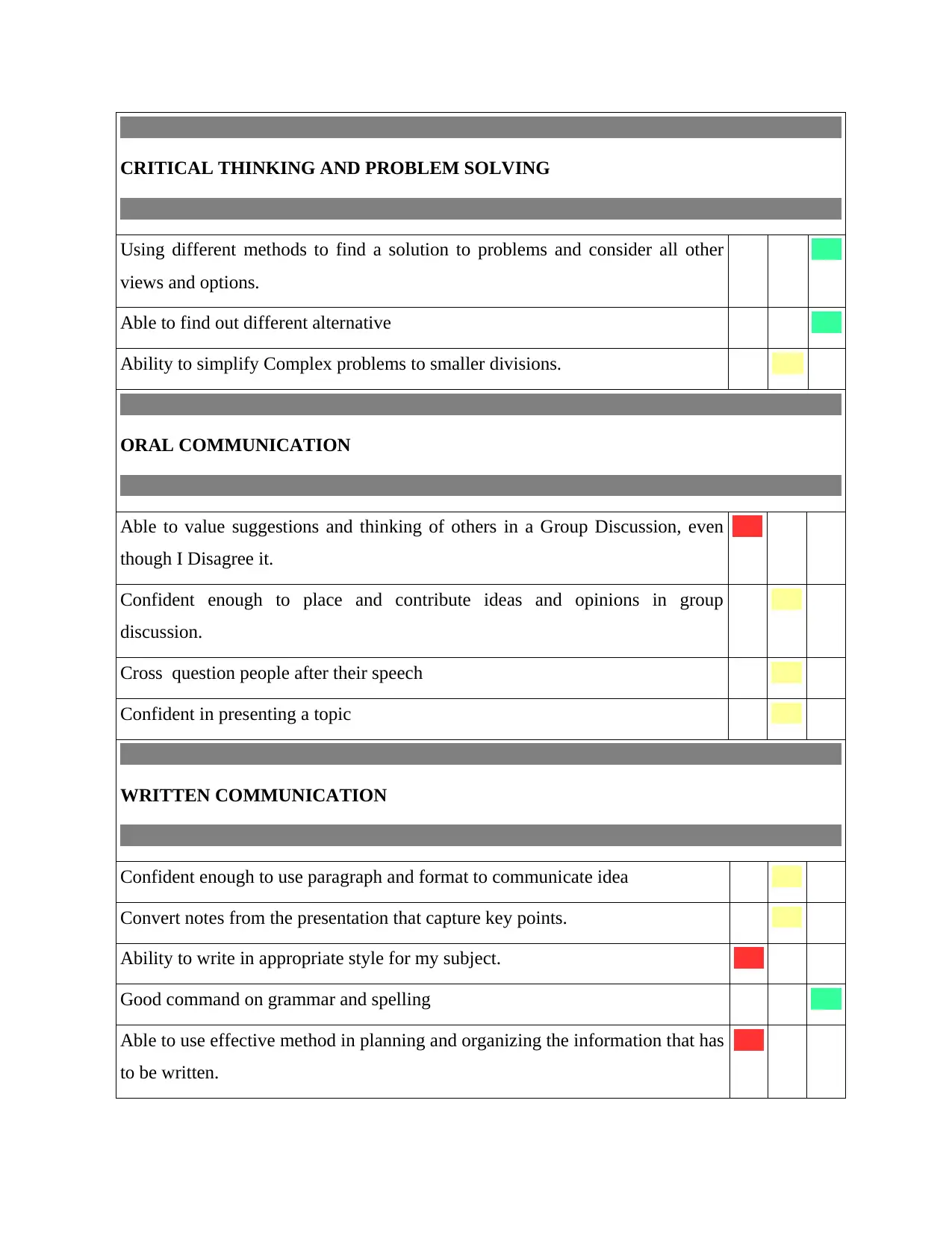
CRITICAL THINKING AND PROBLEM SOLVING
Using different methods to find a solution to problems and consider all other
views and options.
Able to find out different alternative
Ability to simplify Complex problems to smaller divisions.
ORAL COMMUNICATION
Able to value suggestions and thinking of others in a Group Discussion, even
though I Disagree it.
Confident enough to place and contribute ideas and opinions in group
discussion.
Cross question people after their speech
Confident in presenting a topic
WRITTEN COMMUNICATION
Confident enough to use paragraph and format to communicate idea
Convert notes from the presentation that capture key points.
Ability to write in appropriate style for my subject.
Good command on grammar and spelling
Able to use effective method in planning and organizing the information that has
to be written.
Using different methods to find a solution to problems and consider all other
views and options.
Able to find out different alternative
Ability to simplify Complex problems to smaller divisions.
ORAL COMMUNICATION
Able to value suggestions and thinking of others in a Group Discussion, even
though I Disagree it.
Confident enough to place and contribute ideas and opinions in group
discussion.
Cross question people after their speech
Confident in presenting a topic
WRITTEN COMMUNICATION
Confident enough to use paragraph and format to communicate idea
Convert notes from the presentation that capture key points.
Ability to write in appropriate style for my subject.
Good command on grammar and spelling
Able to use effective method in planning and organizing the information that has
to be written.
⊘ This is a preview!⊘
Do you want full access?
Subscribe today to unlock all pages.

Trusted by 1+ million students worldwide
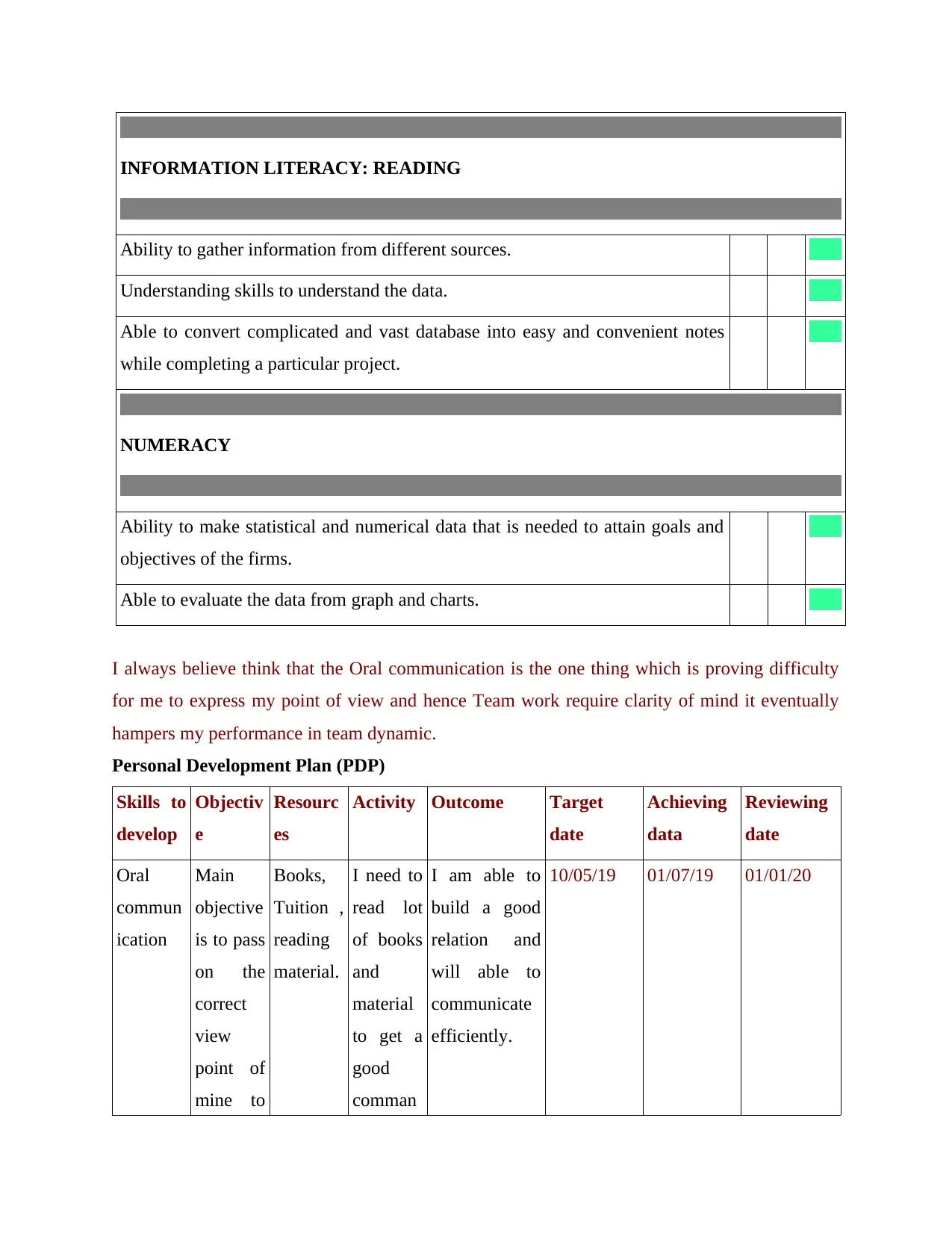
INFORMATION LITERACY: READING
Ability to gather information from different sources.
Understanding skills to understand the data.
Able to convert complicated and vast database into easy and convenient notes
while completing a particular project.
NUMERACY
Ability to make statistical and numerical data that is needed to attain goals and
objectives of the firms.
Able to evaluate the data from graph and charts.
I always believe think that the Oral communication is the one thing which is proving difficulty
for me to express my point of view and hence Team work require clarity of mind it eventually
hampers my performance in team dynamic.
Personal Development Plan (PDP)
Skills to
develop
Objectiv
e
Resourc
es
Activity Outcome Target
date
Achieving
data
Reviewing
date
Oral
commun
ication
Main
objective
is to pass
on the
correct
view
point of
mine to
Books,
Tuition ,
reading
material.
I need to
read lot
of books
and
material
to get a
good
comman
I am able to
build a good
relation and
will able to
communicate
efficiently.
10/05/19 01/07/19 01/01/20
Ability to gather information from different sources.
Understanding skills to understand the data.
Able to convert complicated and vast database into easy and convenient notes
while completing a particular project.
NUMERACY
Ability to make statistical and numerical data that is needed to attain goals and
objectives of the firms.
Able to evaluate the data from graph and charts.
I always believe think that the Oral communication is the one thing which is proving difficulty
for me to express my point of view and hence Team work require clarity of mind it eventually
hampers my performance in team dynamic.
Personal Development Plan (PDP)
Skills to
develop
Objectiv
e
Resourc
es
Activity Outcome Target
date
Achieving
data
Reviewing
date
Oral
commun
ication
Main
objective
is to pass
on the
correct
view
point of
mine to
Books,
Tuition ,
reading
material.
I need to
read lot
of books
and
material
to get a
good
comman
I am able to
build a good
relation and
will able to
communicate
efficiently.
10/05/19 01/07/19 01/01/20
Paraphrase This Document
Need a fresh take? Get an instant paraphrase of this document with our AI Paraphraser
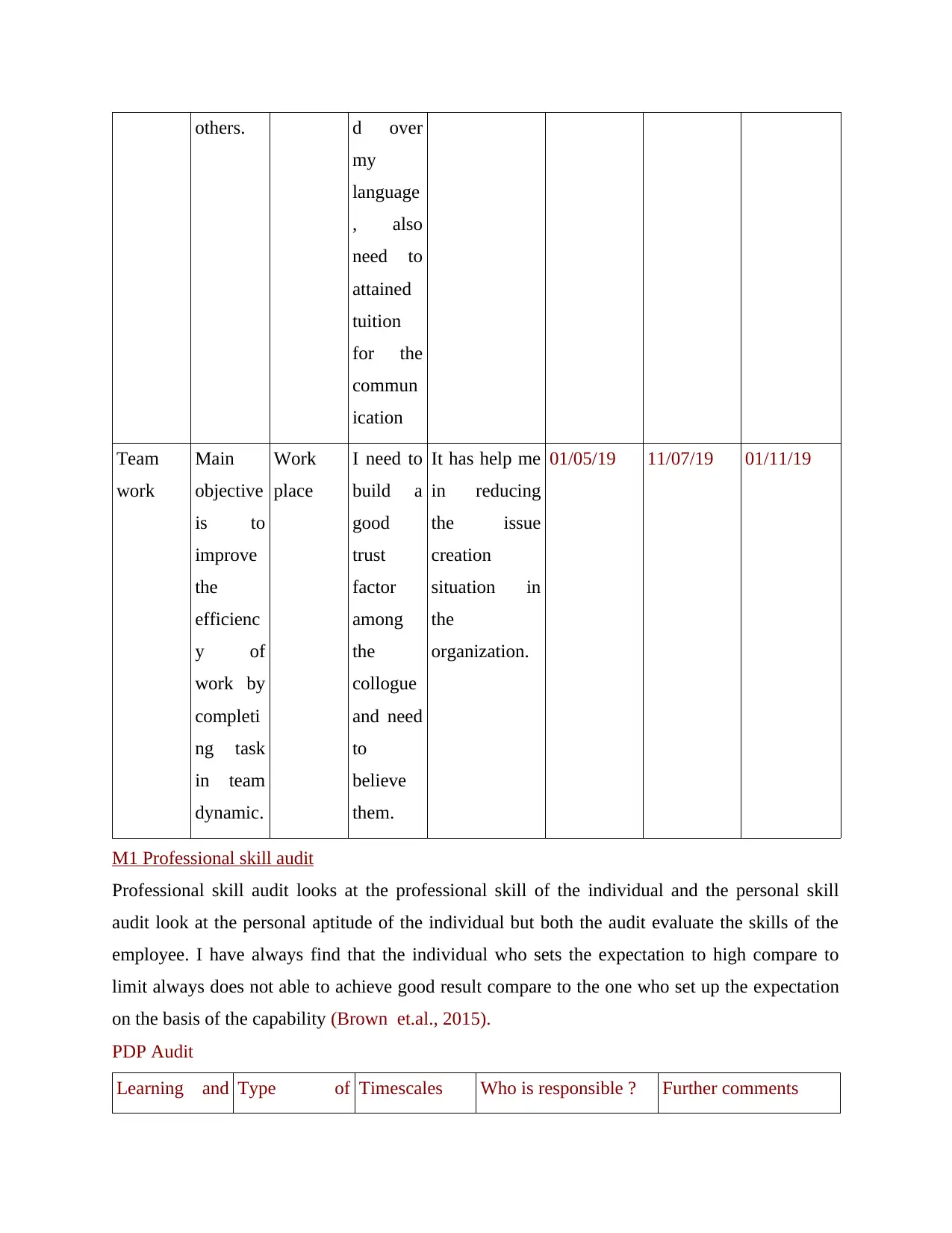
others. d over
my
language
, also
need to
attained
tuition
for the
commun
ication
Team
work
Main
objective
is to
improve
the
efficienc
y of
work by
completi
ng task
in team
dynamic.
Work
place
I need to
build a
good
trust
factor
among
the
collogue
and need
to
believe
them.
It has help me
in reducing
the issue
creation
situation in
the
organization.
01/05/19 11/07/19 01/11/19
M1 Professional skill audit
Professional skill audit looks at the professional skill of the individual and the personal skill
audit look at the personal aptitude of the individual but both the audit evaluate the skills of the
employee. I have always find that the individual who sets the expectation to high compare to
limit always does not able to achieve good result compare to the one who set up the expectation
on the basis of the capability (Brown et.al., 2015).
PDP Audit
Learning and Type of Timescales Who is responsible ? Further comments
my
language
, also
need to
attained
tuition
for the
commun
ication
Team
work
Main
objective
is to
improve
the
efficienc
y of
work by
completi
ng task
in team
dynamic.
Work
place
I need to
build a
good
trust
factor
among
the
collogue
and need
to
believe
them.
It has help me
in reducing
the issue
creation
situation in
the
organization.
01/05/19 11/07/19 01/11/19
M1 Professional skill audit
Professional skill audit looks at the professional skill of the individual and the personal skill
audit look at the personal aptitude of the individual but both the audit evaluate the skills of the
employee. I have always find that the individual who sets the expectation to high compare to
limit always does not able to achieve good result compare to the one who set up the expectation
on the basis of the capability (Brown et.al., 2015).
PDP Audit
Learning and Type of Timescales Who is responsible ? Further comments
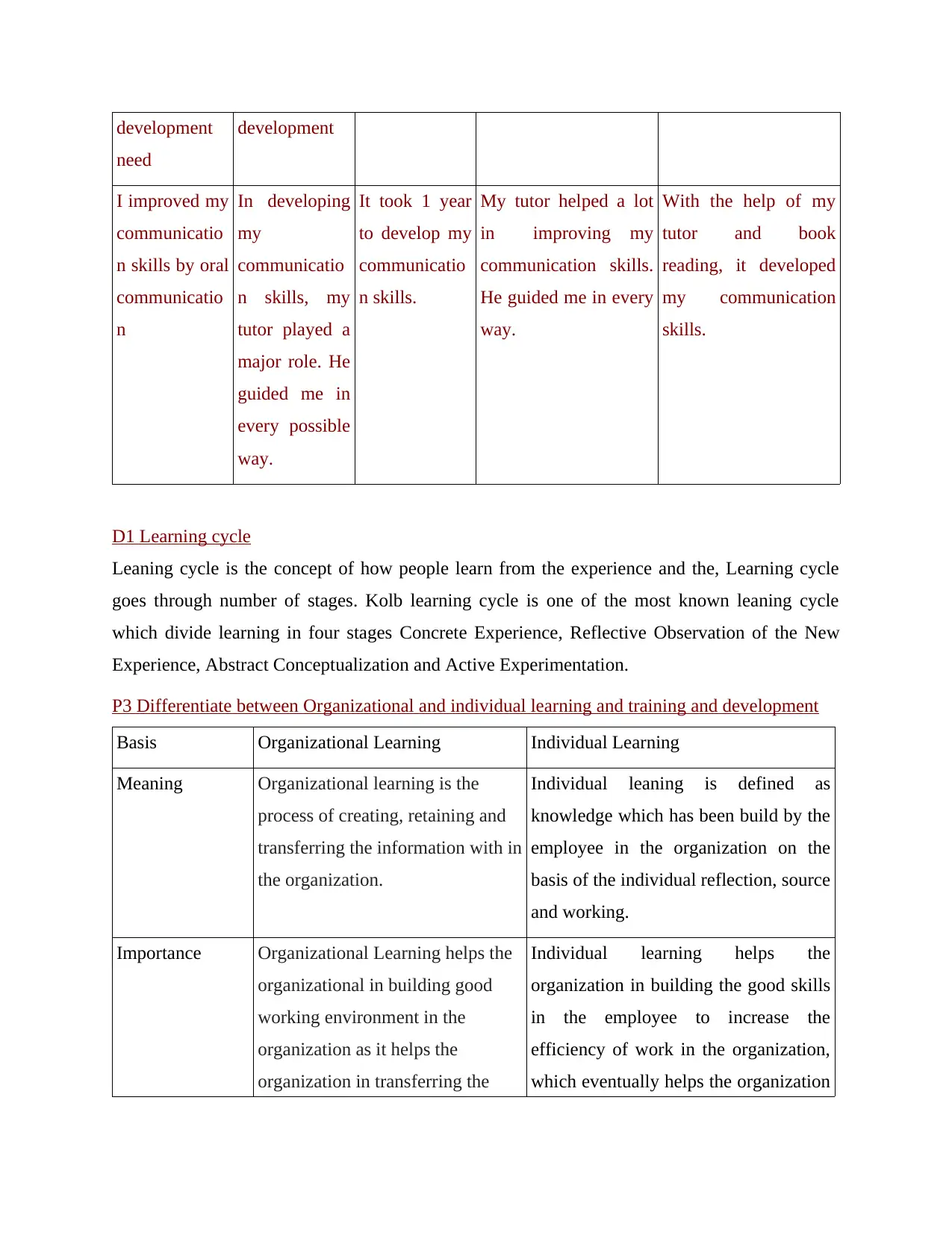
development
need
development
I improved my
communicatio
n skills by oral
communicatio
n
In developing
my
communicatio
n skills, my
tutor played a
major role. He
guided me in
every possible
way.
It took 1 year
to develop my
communicatio
n skills.
My tutor helped a lot
in improving my
communication skills.
He guided me in every
way.
With the help of my
tutor and book
reading, it developed
my communication
skills.
D1 Learning cycle
Leaning cycle is the concept of how people learn from the experience and the, Learning cycle
goes through number of stages. Kolb learning cycle is one of the most known leaning cycle
which divide learning in four stages Concrete Experience, Reflective Observation of the New
Experience, Abstract Conceptualization and Active Experimentation.
P3 Differentiate between Organizational and individual learning and training and development
Basis Organizational Learning Individual Learning
Meaning Organizational learning is the
process of creating, retaining and
transferring the information with in
the organization.
Individual leaning is defined as
knowledge which has been build by the
employee in the organization on the
basis of the individual reflection, source
and working.
Importance Organizational Learning helps the
organizational in building good
working environment in the
organization as it helps the
organization in transferring the
Individual learning helps the
organization in building the good skills
in the employee to increase the
efficiency of work in the organization,
which eventually helps the organization
need
development
I improved my
communicatio
n skills by oral
communicatio
n
In developing
my
communicatio
n skills, my
tutor played a
major role. He
guided me in
every possible
way.
It took 1 year
to develop my
communicatio
n skills.
My tutor helped a lot
in improving my
communication skills.
He guided me in every
way.
With the help of my
tutor and book
reading, it developed
my communication
skills.
D1 Learning cycle
Leaning cycle is the concept of how people learn from the experience and the, Learning cycle
goes through number of stages. Kolb learning cycle is one of the most known leaning cycle
which divide learning in four stages Concrete Experience, Reflective Observation of the New
Experience, Abstract Conceptualization and Active Experimentation.
P3 Differentiate between Organizational and individual learning and training and development
Basis Organizational Learning Individual Learning
Meaning Organizational learning is the
process of creating, retaining and
transferring the information with in
the organization.
Individual leaning is defined as
knowledge which has been build by the
employee in the organization on the
basis of the individual reflection, source
and working.
Importance Organizational Learning helps the
organizational in building good
working environment in the
organization as it helps the
organization in transferring the
Individual learning helps the
organization in building the good skills
in the employee to increase the
efficiency of work in the organization,
which eventually helps the organization
⊘ This is a preview!⊘
Do you want full access?
Subscribe today to unlock all pages.

Trusted by 1+ million students worldwide
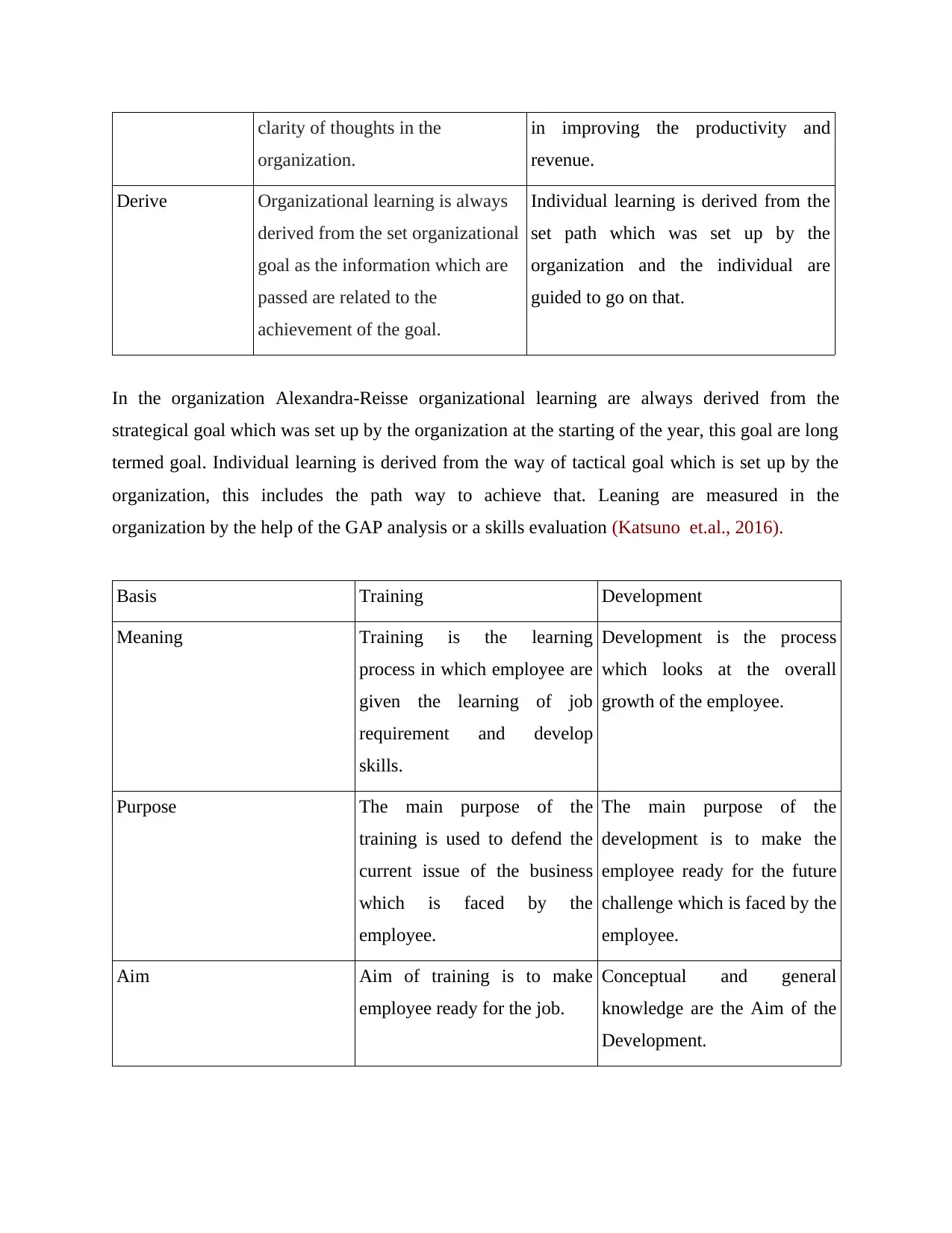
clarity of thoughts in the
organization.
in improving the productivity and
revenue.
Derive Organizational learning is always
derived from the set organizational
goal as the information which are
passed are related to the
achievement of the goal.
Individual learning is derived from the
set path which was set up by the
organization and the individual are
guided to go on that.
In the organization Alexandra-Reisse organizational learning are always derived from the
strategical goal which was set up by the organization at the starting of the year, this goal are long
termed goal. Individual learning is derived from the way of tactical goal which is set up by the
organization, this includes the path way to achieve that. Leaning are measured in the
organization by the help of the GAP analysis or a skills evaluation (Katsuno et.al., 2016).
Basis Training Development
Meaning Training is the learning
process in which employee are
given the learning of job
requirement and develop
skills.
Development is the process
which looks at the overall
growth of the employee.
Purpose The main purpose of the
training is used to defend the
current issue of the business
which is faced by the
employee.
The main purpose of the
development is to make the
employee ready for the future
challenge which is faced by the
employee.
Aim Aim of training is to make
employee ready for the job.
Conceptual and general
knowledge are the Aim of the
Development.
organization.
in improving the productivity and
revenue.
Derive Organizational learning is always
derived from the set organizational
goal as the information which are
passed are related to the
achievement of the goal.
Individual learning is derived from the
set path which was set up by the
organization and the individual are
guided to go on that.
In the organization Alexandra-Reisse organizational learning are always derived from the
strategical goal which was set up by the organization at the starting of the year, this goal are long
termed goal. Individual learning is derived from the way of tactical goal which is set up by the
organization, this includes the path way to achieve that. Leaning are measured in the
organization by the help of the GAP analysis or a skills evaluation (Katsuno et.al., 2016).
Basis Training Development
Meaning Training is the learning
process in which employee are
given the learning of job
requirement and develop
skills.
Development is the process
which looks at the overall
growth of the employee.
Purpose The main purpose of the
training is used to defend the
current issue of the business
which is faced by the
employee.
The main purpose of the
development is to make the
employee ready for the future
challenge which is faced by the
employee.
Aim Aim of training is to make
employee ready for the job.
Conceptual and general
knowledge are the Aim of the
Development.
Paraphrase This Document
Need a fresh take? Get an instant paraphrase of this document with our AI Paraphraser
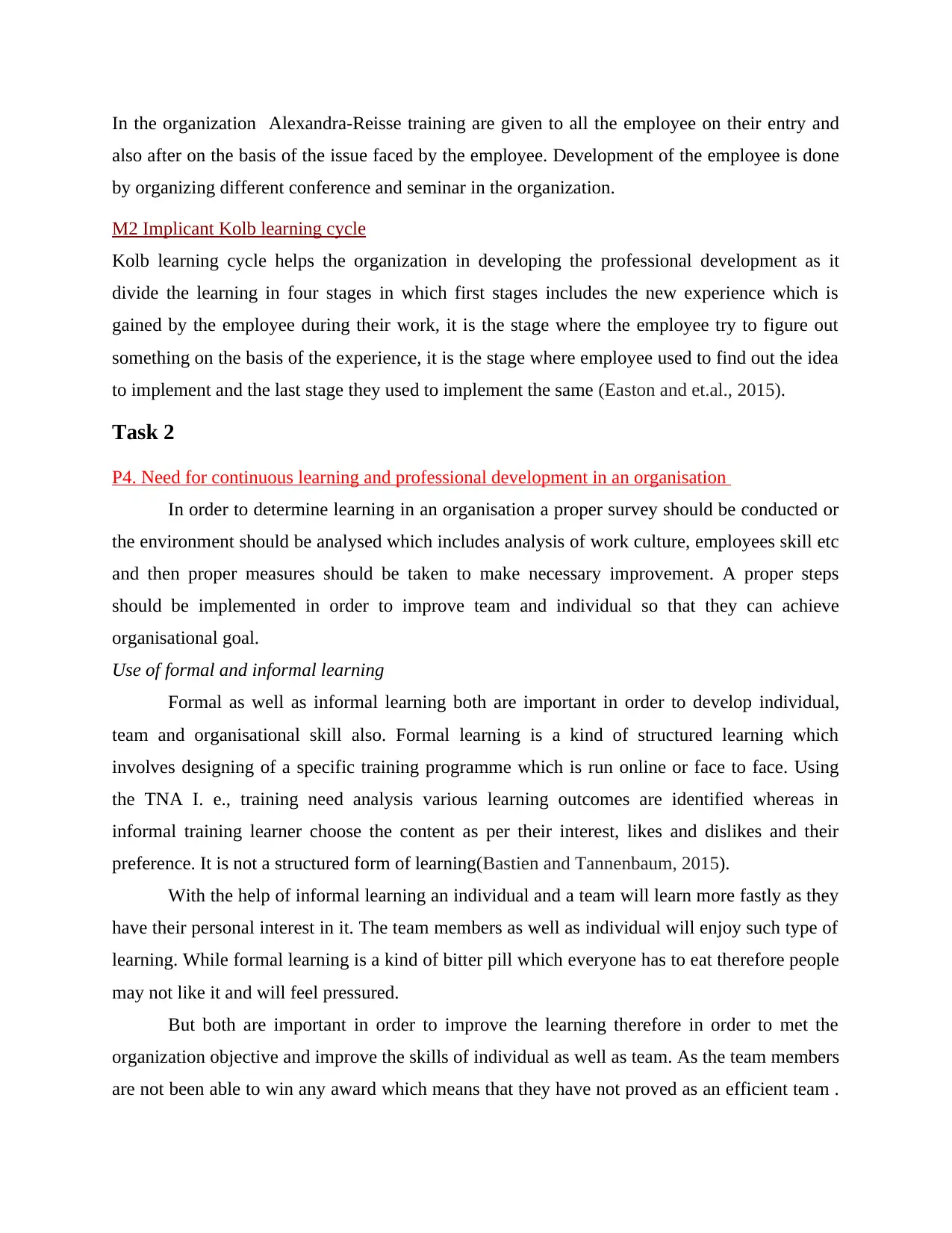
In the organization Alexandra-Reisse training are given to all the employee on their entry and
also after on the basis of the issue faced by the employee. Development of the employee is done
by organizing different conference and seminar in the organization.
M2 Implicant Kolb learning cycle
Kolb learning cycle helps the organization in developing the professional development as it
divide the learning in four stages in which first stages includes the new experience which is
gained by the employee during their work, it is the stage where the employee try to figure out
something on the basis of the experience, it is the stage where employee used to find out the idea
to implement and the last stage they used to implement the same (Easton and et.al., 2015).
Task 2
P4. Need for continuous learning and professional development in an organisation
In order to determine learning in an organisation a proper survey should be conducted or
the environment should be analysed which includes analysis of work culture, employees skill etc
and then proper measures should be taken to make necessary improvement. A proper steps
should be implemented in order to improve team and individual so that they can achieve
organisational goal.
Use of formal and informal learning
Formal as well as informal learning both are important in order to develop individual,
team and organisational skill also. Formal learning is a kind of structured learning which
involves designing of a specific training programme which is run online or face to face. Using
the TNA I. e., training need analysis various learning outcomes are identified whereas in
informal training learner choose the content as per their interest, likes and dislikes and their
preference. It is not a structured form of learning(Bastien and Tannenbaum, 2015).
With the help of informal learning an individual and a team will learn more fastly as they
have their personal interest in it. The team members as well as individual will enjoy such type of
learning. While formal learning is a kind of bitter pill which everyone has to eat therefore people
may not like it and will feel pressured.
But both are important in order to improve the learning therefore in order to met the
organization objective and improve the skills of individual as well as team. As the team members
are not been able to win any award which means that they have not proved as an efficient team .
also after on the basis of the issue faced by the employee. Development of the employee is done
by organizing different conference and seminar in the organization.
M2 Implicant Kolb learning cycle
Kolb learning cycle helps the organization in developing the professional development as it
divide the learning in four stages in which first stages includes the new experience which is
gained by the employee during their work, it is the stage where the employee try to figure out
something on the basis of the experience, it is the stage where employee used to find out the idea
to implement and the last stage they used to implement the same (Easton and et.al., 2015).
Task 2
P4. Need for continuous learning and professional development in an organisation
In order to determine learning in an organisation a proper survey should be conducted or
the environment should be analysed which includes analysis of work culture, employees skill etc
and then proper measures should be taken to make necessary improvement. A proper steps
should be implemented in order to improve team and individual so that they can achieve
organisational goal.
Use of formal and informal learning
Formal as well as informal learning both are important in order to develop individual,
team and organisational skill also. Formal learning is a kind of structured learning which
involves designing of a specific training programme which is run online or face to face. Using
the TNA I. e., training need analysis various learning outcomes are identified whereas in
informal training learner choose the content as per their interest, likes and dislikes and their
preference. It is not a structured form of learning(Bastien and Tannenbaum, 2015).
With the help of informal learning an individual and a team will learn more fastly as they
have their personal interest in it. The team members as well as individual will enjoy such type of
learning. While formal learning is a kind of bitter pill which everyone has to eat therefore people
may not like it and will feel pressured.
But both are important in order to improve the learning therefore in order to met the
organization objective and improve the skills of individual as well as team. As the team members
are not been able to win any award which means that they have not proved as an efficient team .
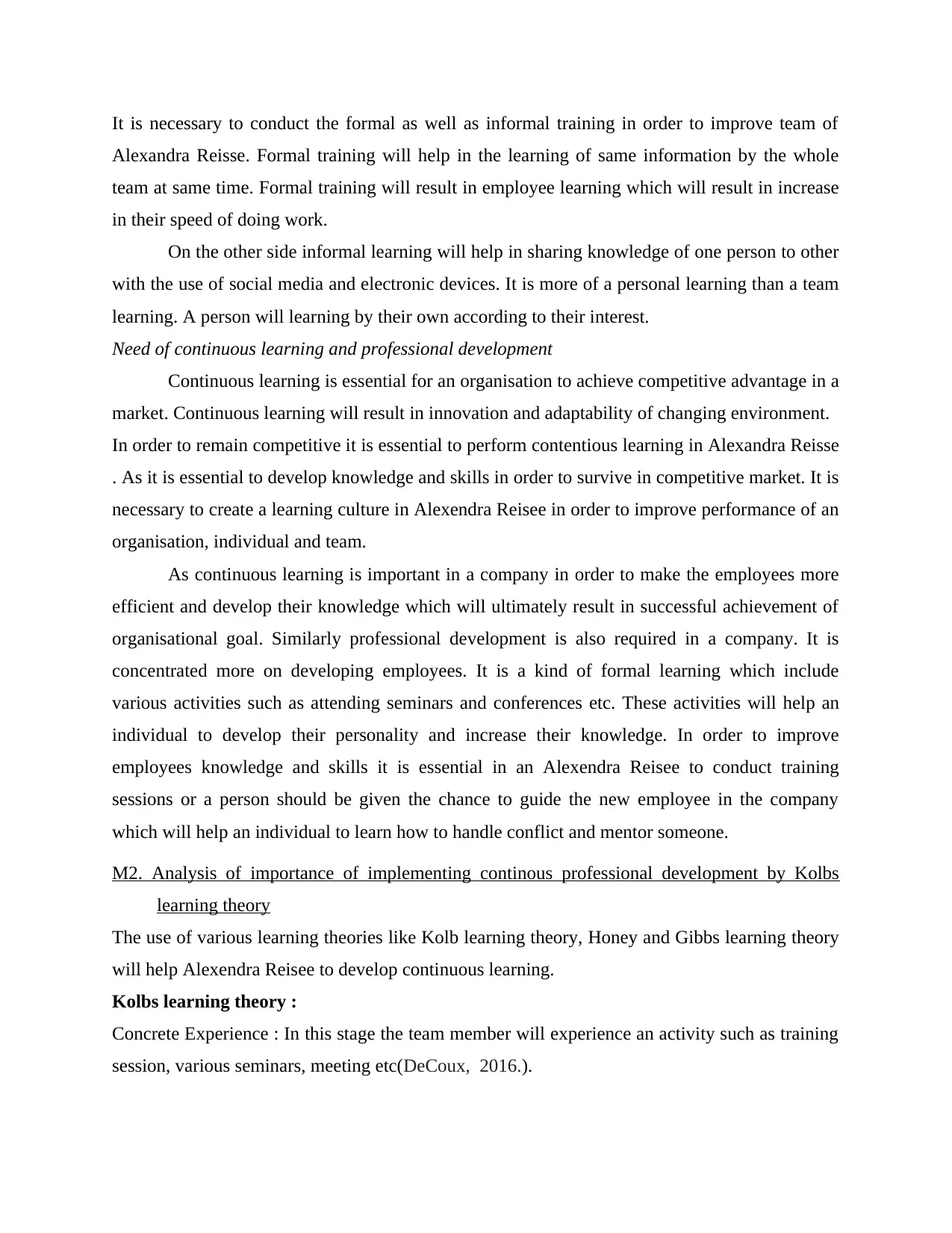
It is necessary to conduct the formal as well as informal training in order to improve team of
Alexandra Reisse. Formal training will help in the learning of same information by the whole
team at same time. Formal training will result in employee learning which will result in increase
in their speed of doing work.
On the other side informal learning will help in sharing knowledge of one person to other
with the use of social media and electronic devices. It is more of a personal learning than a team
learning. A person will learning by their own according to their interest.
Need of continuous learning and professional development
Continuous learning is essential for an organisation to achieve competitive advantage in a
market. Continuous learning will result in innovation and adaptability of changing environment.
In order to remain competitive it is essential to perform contentious learning in Alexandra Reisse
. As it is essential to develop knowledge and skills in order to survive in competitive market. It is
necessary to create a learning culture in Alexendra Reisee in order to improve performance of an
organisation, individual and team.
As continuous learning is important in a company in order to make the employees more
efficient and develop their knowledge which will ultimately result in successful achievement of
organisational goal. Similarly professional development is also required in a company. It is
concentrated more on developing employees. It is a kind of formal learning which include
various activities such as attending seminars and conferences etc. These activities will help an
individual to develop their personality and increase their knowledge. In order to improve
employees knowledge and skills it is essential in an Alexendra Reisee to conduct training
sessions or a person should be given the chance to guide the new employee in the company
which will help an individual to learn how to handle conflict and mentor someone.
M2. Analysis of importance of implementing continous professional development by Kolbs
learning theory
The use of various learning theories like Kolb learning theory, Honey and Gibbs learning theory
will help Alexendra Reisee to develop continuous learning.
Kolbs learning theory :
Concrete Experience : In this stage the team member will experience an activity such as training
session, various seminars, meeting etc(DeCoux, 2016.).
Alexandra Reisse. Formal training will help in the learning of same information by the whole
team at same time. Formal training will result in employee learning which will result in increase
in their speed of doing work.
On the other side informal learning will help in sharing knowledge of one person to other
with the use of social media and electronic devices. It is more of a personal learning than a team
learning. A person will learning by their own according to their interest.
Need of continuous learning and professional development
Continuous learning is essential for an organisation to achieve competitive advantage in a
market. Continuous learning will result in innovation and adaptability of changing environment.
In order to remain competitive it is essential to perform contentious learning in Alexandra Reisse
. As it is essential to develop knowledge and skills in order to survive in competitive market. It is
necessary to create a learning culture in Alexendra Reisee in order to improve performance of an
organisation, individual and team.
As continuous learning is important in a company in order to make the employees more
efficient and develop their knowledge which will ultimately result in successful achievement of
organisational goal. Similarly professional development is also required in a company. It is
concentrated more on developing employees. It is a kind of formal learning which include
various activities such as attending seminars and conferences etc. These activities will help an
individual to develop their personality and increase their knowledge. In order to improve
employees knowledge and skills it is essential in an Alexendra Reisee to conduct training
sessions or a person should be given the chance to guide the new employee in the company
which will help an individual to learn how to handle conflict and mentor someone.
M2. Analysis of importance of implementing continous professional development by Kolbs
learning theory
The use of various learning theories like Kolb learning theory, Honey and Gibbs learning theory
will help Alexendra Reisee to develop continuous learning.
Kolbs learning theory :
Concrete Experience : In this stage the team member will experience an activity such as training
session, various seminars, meeting etc(DeCoux, 2016.).
⊘ This is a preview!⊘
Do you want full access?
Subscribe today to unlock all pages.

Trusted by 1+ million students worldwide
1 out of 17
Related Documents
Your All-in-One AI-Powered Toolkit for Academic Success.
+13062052269
info@desklib.com
Available 24*7 on WhatsApp / Email
![[object Object]](/_next/static/media/star-bottom.7253800d.svg)
Unlock your academic potential
Copyright © 2020–2026 A2Z Services. All Rights Reserved. Developed and managed by ZUCOL.


